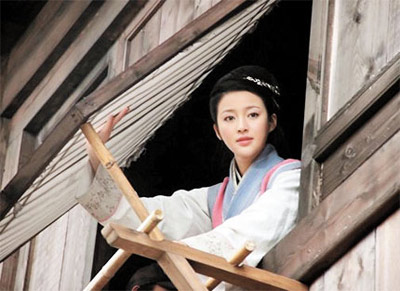

 |
|
In the latest remade TV series of Chinese classic "Water Margin" (top), which was originally written by men for men, has roused big controversy as the minor female character Pan Jinlian (inserted), a vicious and lewd woman in the novel, is portrayed as a big role and a pure woman brave to pursue her true love. [Shanghai Daily] |
The Chinese literary classic "Water Margin" ("Outlaws of the Marsh," "All Men are Brothers") has been adapted into TV series over the years, celebrating the exploits of 108 outlaws who fought oppression and corruption in the late 11th century. In general, they stick fairly close to the plot.
But the newest 80-episode incarnation, now being aired nightly has generated unprecedented criticism for highlighting the roles of four traditionally (in the classic) unsavory and unconventional women. In the original, all are extremely minor characters, but also strong-minded, several of them physically large and strong, skilled in martial arts. There's at least one adulteress, a tavern keeper, two murderers and two skilled warriors.
The series is at its midpoint. It's aired nightly on Dragon TV, at 7:30pm, with two episodes shown a night.
In the new version by Hong Kong director Kuk Kok-leung, the women play major roles and in fact, love and lust in quite a few instances drive the plot.
And they are all attractive, some extremely elegant and feminine, wearing fine clothes though they are hiding in the marsh area south of the Yangtze River at the end of the Song Dynasty (960-1279).
The three lady outlaws are Sun Erniang, known as a "Female Yaksha" (ghost); Gu Dasao, known as the "Female Tiger," and Hu Sanniang, known as "Ten Feet of Blue," referring to her blue hair.
Gu and Hu are warriors and not described as pretty or feminine; they are strong. The wicked one is Sun Erniang: she runs a tavern where she drugs patrons, robs them, cuts them up to make stuffing for dumplings she sells to other patrons.
Actresses slaying Gu and Hu are young and beautiful, even killer cook Sun is attractive - quite unlike their personas in print.
In the classic, a band of 108 outlaws, including three women, defy the corrupt government. They are men's stories, with lots of battles, written by men and for men. The tales were pulled together by Shi Nai'an in the early 16th century.
"There are few female characters in the book, and the writer seldom tackles and or even touches the inner world of women," says an Internet user who calls herself Little Water Droplet.
"The new TV drama version offers a romantic and female perspective, and several aesthetic scenes of the drama make it more like an idol drama," he observes.
Some foreigners have jokingly termed "Water Margin" "Three Women and 105 Men," because there are only three female outlaws.
There is a fourth woman, Pan Jinlian, whose murder (to avenge the death of his brother) sends hero Wu Song into the marshes to join the outlaws. Pan is generally considered wanton, lewd and reckless, but she's far from it in the new shows.
Her appearance is the most controversial in the series. Pan is married to Wu's ugly brother. She tries to woo handsome Wu Song, who rejects her. She then has an affair with a wealthy businessman Ximen Qing, abetted by an old granny Wang Po. The husband finds them in bed and the two conspire with the help of Wang to poison her husband with his medicine. Wu discovers the truth, slays Ximen, ensures Wang is sliced to death by an executioner, and as for the adulteress Pan: he extracts a confession and then decapitates and disembowels her. That's in the book.
But in the TV version she runs toward Wu's sword bravely and commits suicide, with her sweet memories with Ximen flashing on the screen again and again.
"She looks so pure, stunning and fulfilled when she kills herself," says viewer Wang Lei. "Pan seems to be the victim of a tragic marriage and the male-dominated world. The message is that both she and her lover are not much to blame for pursuing true love."